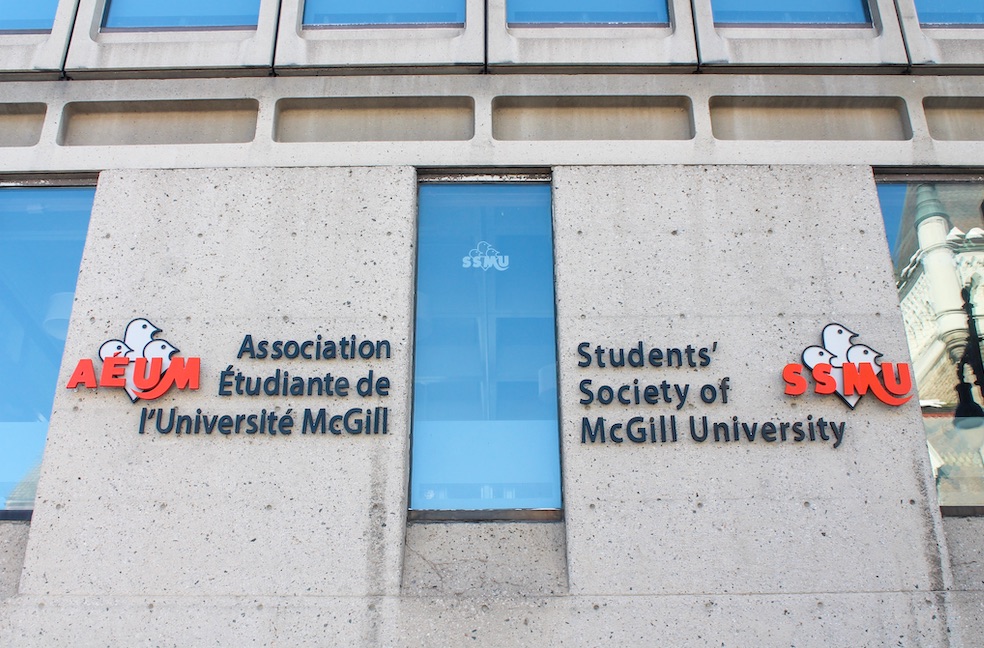The Students’ Society of McGill University’s (SSMU) Legislative Council convened on Feb. 25, where council members voted on the Motion Regarding the Adoption of the Divest for Human Rights Policy. The policy encourages SSMU to lobby the McGill administration to divest from companies that are complicit in a variety of human rights violations. It was initially put forth at the Feb. 16 SSMU General Assembly (GA), but was only adopted in a consultative capacity after approximately 80 attendees left the meeting prior to the vote, causing the assembly to lose quorum. Following 90 per cent approval for the motion at the GA, the coalition that authored the motion released a petition on Feb. 22 to encourage the Legislative Council to vote in favour of the motion.
The policy targets companies such as Puma and Nordstrom, which profit off China’s incarceration of the Ugyhur people in East Turkestan through the use of forced labour camps. Other companies mentioned in the policy include the Oshkosh Corporation, which manufactures vehicles that the Israeli military uses.
SSMU Vice-President (VP) of External Affairs Ayo Ogunremi urged the council to keep the results of the GA in mind when discussing the motion.
“I would note the significance of the motion being approved last week at the consultative forum and […] the fact that quorum was reached at GA last week and then was lost as a result of an exit [of a significant number of students],” Ogunremi said. “The result was 90 per cent in favour of this motion. I think that’s very important to consider going forward.”
The debate period, which lasted for almost two hours, centred on sections 3.2.2 and 3.2.3 of the policy—sections that call to divest from arms manufacturing giant Lockheed Martin, and Re/Max, a real-estate company operating in occupied Palestinian territories. Some councillors believed that the policy unfairly targeted Israel, while others argued that this focus detracted from its substance, and defended the policy.
Maya Garfinkel, a U3 Arts student and research coordinator for Students for Peace and Disarmament, argued that the concerns surrounding human rights that were mentioned in the policy are important to McGill students.
“There have been claims here that [the motion] misrepresents what is going on in Israel and Palestine right now,” Garfinkel said. “I just want to ask, what claim for Palestinian human rights would this council not take issue with? Anything regarding Palestinian human rights is contentious, and the reason that we’re bringing this up is because McGill students are concerned with these issues.”
Councillors on both sides of the issue were optimistic about the engagement in student government that the policy garnered, given that the petition urging the Legislative Council to vote in favour of the motion received 378 signatures. VP University Affairs Brooklyn Frizzle noted that the motion encouraged students to voice their concerns on issues relating to student governance.
“While I understand concerns over the disenfranchisement of students, I would say that this is an example of students being engaged, interested, and hopeful [about] participation in student governance,” Frizzle said.
The motion was approved, with 21 councillors voting in favour, four abstaining, and five opposed.
The Council also approved a motion amending the internal regulations of elections and referenda, which would provide a clear framework for students to organize “No” campaigns in opposition to a referendum question. The motion was approved with 29 in favour, one abstention, and none against.
Moment of the Meeting:
Management Representative Noah Gundermann unsuccessfully moved to postpone the Motion Regarding the Adoption of the Divest for Human Rights Policy as the minutes from the GA had not been distributed to councillors before the meeting, as per SSMU’s internal regulations on governance. No one seconded it, and the debate proceeded as planned.
Soundbite:
“While I understand the importance of [the] SSMU’s mandate to be a leader in cultural, social, and environmental issues, many of my constituents mention this as a reason for being inactive and disillusioned with student government. They’re frustrated when they see most of their representatives’ time being taken up by hot-button global issues when it feels to them that the issues they face on campus, such as the lack of support for sexual assault survivors and inadequate mental health resources, seem to fall by the wayside.” – Libby Williamson, Arts Representative to SSMU, on her reasons for opposing the Divest for Human Rights motion.









